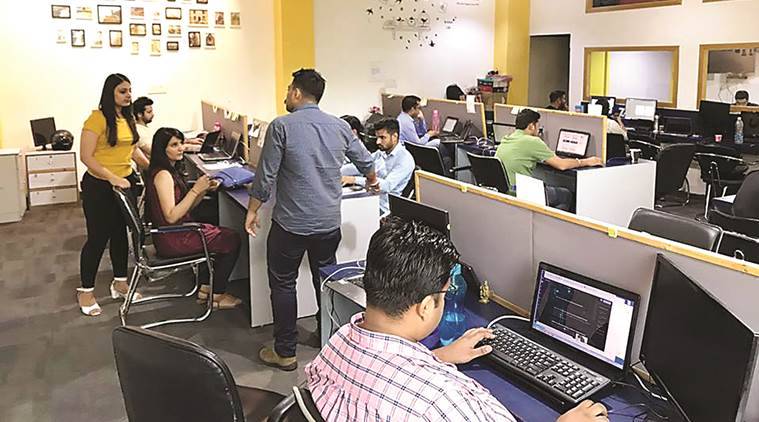- India
- International
Lockdown squeeze, work-from-home: several companies vacate office space
Food-tech platform Zomato, which recently asked 13 per cent of its workforce to search for new jobs, has also decided to shut 125 of over 150 offices worldwide. Its rival Swiggy has decided to lay off 1,100 people, in addition to scaling down on kitchen facilities and office infrastructure.
 According to a survey by IT sector industry body NASSCOM, 30-40% of over 250 start-ups have either temporarily halted operations or are closing down. (Representational Image)
According to a survey by IT sector industry body NASSCOM, 30-40% of over 250 start-ups have either temporarily halted operations or are closing down. (Representational Image)
It’s not just layoffs and reduced operations. From banks to start-ups, the nearly three-month-long Covid lockdown, and the push for employees to work from home, is forcing Corporate India to vacate commercially leased spaces, too.
Food-tech platform Zomato, which recently asked 13 per cent of its workforce to search for new jobs, has also decided to shut 125 of over 150 offices worldwide. Its rival Swiggy has decided to lay off 1,100 people, in addition to scaling down on kitchen facilities and office infrastructure.
Read| Govt extends relaxed ‘work from home’ norms till July 31 for IT firms, BPOs
Private-sector lender IndusInd Bank is learnt to have vacated one of its prominently-located leased office spaces in Mumbai, with plans to bring down lease-rents. Health and wellness platform Curefit, too, laid off around 800 employees and permanently closed a number of its centres to manage costs.
According to a survey by IT sector industry body NASSCOM, 30-40% of over 250 start-ups have either temporarily halted operations or are closing down.
Zomato CEO Deepinder Goyal wrote in an e-mail sent to employees that other than payroll, the company’s biggest recurring expense was real estate. He said the company has decided to make partial or full work from home a “permanent feature”.

Read| Explained: What are the guidelines for offices that are reopening?
“The management has realised that work from home is an easily workable solution and thus office spaces is one area where costs could be cut. So a number of office spaces will no longer be retained,” a company executive told The Indian Express.
When contacted, Zomato declined to comment on the issue. Swiggy, too, pointed out that it had already begun the process of scaling down its kitchen facilities temporarily or permanently.
Swiggy CEO Sriharsha Majety wrote in an email to employees: “Identify and significantly reduce every single indirect cost like hubs, office infrastructure, etc… it is one of the areas where we feel the cut is most prudent given it doesn’t affect customer or employee experience.”
Bengaluru-based business-to-business online marketplace Udaan is learnt to have laid off as many as 2,000 contractual employees from sales, marketing, and daily operations teams. The company is also learnt to have suspended its operations and vacated some of the office spaces it had leased on flexible payments models.
Similarly, a Pune-based cloud kitchen company has shut down or scaled back most of its backroom stores and asked employees at these locations to take unpaid leave until further instructions.
Read| Long hours, coordination trouble: Work from home isn’t really easy
The net absorption of office spaces in India, which witnessed a steep on-year fall in January-March 2020 — the first fall in the metric observed since the same period in 2017 following demonetisation — is expected to be hit further by significantly scaled-down operations in tech companies and the shift towards working from home.
A number of companies in the IT services sector, which accounts for the highest share in commercial leasing across the country, have adopted the work-from-home policy as a part of their business continuity plans. Some smaller companies and start-ups have also reduced physical infrastructure as operations have shrunk.
According to a report by real estate services firm JLL, the net absorption — sum of square feet that became physically occupied minus the sum that became physically vacant during a specific period — for January-March was at 8.6 million square feet, 30% lower than the same period in 2019.
Some of the larger IT sector firms are also looking at implementing work from home as a long-term policy. NASSCOM has called for companies to operate with 15-20 per cent workforce till June-July even after the lockdown is over.
Additionally, co-working spaces are also assessing the situation on the account that while the concept of increased remote working may prove beneficial in the longer run, social distancing and the threat of sharing workspaces with unknown people could drive down demand.
“Most corporates would avoid capital expenditures and look to co-working facilities to expand their business. The current situation will also see larger enterprises seeking smaller spaces to ensure synergised business continuity in the near future,” said Manas Mehrotra, co-founder and chairman of Bengaluru-based co-working space 315 Work Avenue.
Alok Kumar, co-founder of Patna-based Work Studio Coworking, said: “Since co-working studios are a high operating expense affair, the sustainability period is very less. One advantage which we have seen during the lockdown period, and expect to have in the days to come, is that we have been getting a lot of inquiry from companies which have decided to shift out of fixed rental and leasing spaces into a more flexible set up. The second is that once the lockdown ends, individuals who have been asked to work from home or remote locations will prefer to work in an office set-up where they can plug and play as there is a lot of disturbance in a home set-up.”
However, some sectoral experts anticipate the space to recover soon enough.
“The lockdown, though protracted, is temporary. In China, people are already back in their offices, and visiting malls and restaurants after hours, while practicing social distancing. There is no reason to believe that India will be very different,” said Prashant Thakur, director & head — research, ANAROCK Property Consultants.
Apr 26: Latest News
- 01
- 02
- 03
- 04
- 05








































